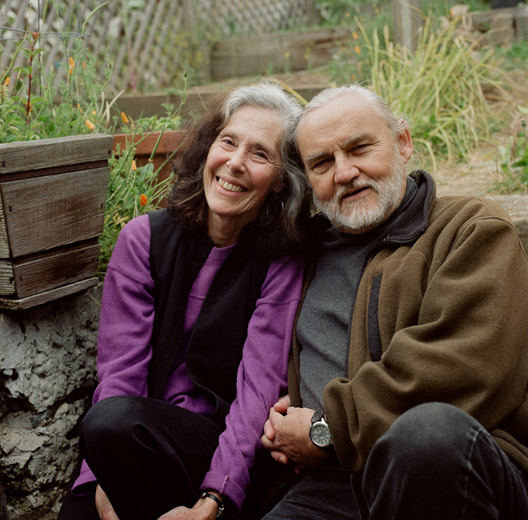
... "Let's say that" bioregionalism "distinguishes a way of thinking that moves from the profound need to re-establish a sacred relationship with the earth. This relationship is conquered starting from the desire to understand - by repaying it - the place where we live. In fact, a bioregion is not a fence whose borders are definitively established but a sort of magnetic field (aura - spiritus loci) distinguishable from the neighboring fields only by the intensity of the characteristics that form its identity, in the same way as human beings, simultaneously different and similar to each other.
It is evident that being the bioregional identity based on the place where you live, while considering that each place is part of the largest bioregion that is Earth itself, the idea of "globalization" is extraneous to bioregionalism, as it tends to homogenise the qualities of places and communities. In this sense it renders the phrase "think globally and act locally" very well.
While it is unnatural to this vision, the concept of globalization in an economic and cultural key, or the forced westernization of the entire land world, through a process aimed at making the economy the only leitmotif of peoples' lives, through the imposition of forced stages of economic liberalism. We can therefore understand how bioregionalism and forced globalization are antithetical. Especially if on the basis of this globalization we place the assertion of the incontrovertible existence of abstract universal values such as democracy, freedom, equality, justice, etc., which must be imposed urbi et orbi, through the guidance of some "elected" nations, leading to consequence of the universal homologation and the consequent cancellation of the single identities.
But beware, Peter Berg's ideological position, as a social facilitator, is that bioregionalism must be 'pro-active'. Guessing the danger of fundamentalism and intransigence, the logic of 'either with us or against us', the 'good and pure' against the 'bad and corrupt'. He perceived the danger in taking "radical ecological" positions, an attitude of superiority that leads some bioregionalists to shut themselves up within their 'tribe' and to look with suspicion if not with hatred on all those who 'still' have not converted to Truth ... This attitude is just as dangerous (and antithetical to bioregionalism) as the globalizing and exporting desire for well-being and democracy all over the world.
Therefore Berg, in this sense, was a "moderate" one who continued to live among the people and with the people refusing the self-ghettoization of the marginality to which we are condemned, when we assume the function of 'elect' who have including how things are and that - using the words of Alessandro Curti - they are destined to be the new prophets, perhaps unheard of by the masses but for this reason even stronger in their convictions and in their struggle against everything and everyone, against the 'infidels' and the 'heretics'..." Taken from the article: "Peter Berg's bioregional and social vision ... pulvis in pulvis and spirit in spirit ... of the Earth".
Paolo D’Arpini - Referent of the Italian Bioregional Network

(September 4, 2011)
Testo italiano
… «Diciamo che il “bioregionalismo” contraddistingue un modo di pensare che muove dall’esigenza profonda di riallacciare un rapporto sacrale con la terra. Questo rapporto si conquista partendo dalla volontà di capire -riabitandolo- il luogo in cui viviamo. Una bioregione infatti non è un recinto di cui si stabiliscono definitivamente i confini ma una sorta di campo magnetico (aura – spiritus loci) distinguibile dai campi vicini solo per l’intensità delle caratteristiche che formano la sua identità, alla stessa stregua degli esseri umani, contemporaneamente diversi e simili l’uno all’altro.
Ѐ evidente che essendo l’identità bioregionale basata sul luogo in cui si vive, pur considerando che ogni luogo è parte della più grande bioregione che è la Terra stessa, l’idea di “globalizzazione” è estranea al bioregionalismo, in quanto tende ad omogenizzare le qualità dei luoghi e delle comunità. In tal senso rende molto bene la frase: “pensare globalmente ed agire localmente”.
Mentre è innaturale a questa visione il concetto di globalizzazione in chiave economica culturale, ovvero l’occidentalizzazione forzata dell’intero orbe terracqueo, attraverso un processo volto a fare dell’economia l’unico leit motiv della vita dei popoli, attraverso l’imposizione a tappe forzate del liberismo economico. Possiamo perciò capire come il bioregionalismo e la globalizzazione forzata siano antitetici. Soprattutto se a base di questa globalizzazione poniamo l’asserzione dell’incontrovertibile esistenza di astratti valori universali quali democrazia, libertà, uguaglianza, giustizia, etc., che vanno imposti urbi et orbi, attraverso la guida di alcune nazioni “elette”, portando per conseguenza all’omologazione universale ed al conseguente annullamento delle singole identità.
Ma attenzione, la posizione ideologica di Peter Berg, come facilitatore sociale, è che il bioregionalismo debba essere ‘pro-attivo’. Indovinando il pericolo del fondamentalismo e dell’intransigenza, la logica del ‘o con noi o contro di noi’, dei ‘buoni e puri’ contro i ‘cattivi e corrotti’. Egli percepì il pericolo nell’assumere posizioni “ecologiste radicali”, un atteggiamento di superiorità che porta alcuni bioregionalisti a rinchiudersi all’interno della propria ‘tribù’ e a guardare con sospetto se non con odio tutti coloro che ‘ancora’ non si sono convertiti alla Verità…
Questo atteggiamento è altrettanto pericoloso (ed antitetico al bioregionalismo) quanto la volontà globalizzatrice ed esportatrice del benessere e della democrazia in tutto il mondo. Perciò Berg, in tal senso, fu un “moderato” uno che continuò a vivere in mezzo alla gente e con la gente rifiutando l’auto-ghetizzazione della marginalità a cui ci si condanna, quando si assume la funzione di ‘eletti’ che hanno compreso come stanno le cose e che -usando le parole di Alessandro Curti- sono destinati ad essere i nuovi profeti, magari inascoltati dalle masse ma per questo ancora più rinsaldati nelle proprie convinzioni e nella propria lotta contro tutto e tutti, contro gli ‘infedeli’ e gli ‘eretici’.» Tratto dall’articolo: “La visione bioregionale e sociale di Peter Berg... pulvis in pulvis e spirito nello spirito... della Terra”.
Paolo D’Arpini - Referente della Rete Bioregionale Italiana
(4 settembre 2011)


Nessun commento:
Posta un commento
Nota. Solo i membri di questo blog possono postare un commento.